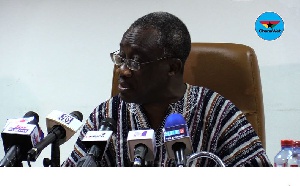 Commissioner General of GRA, Emmanuel Kofi Nti
Commissioner General of GRA, Emmanuel Kofi Nti
The Commissioner General of the Ghana Revenue Authority (GRA), Emmanuel Kofi Nti is about to issue a directive aimed at enforcing the use of the Cargo Tracking Notes (CTN) system by the still huge number of noncompliant companies at the ports.
This follows an impact assessment exercise carried out at the ports by the Customs Division of the GRA which revealed that out of 3007 companies mandated to implement the CTN, only five percent of them have so far been using the system, leaving 95 percent still using the manual system which is meant to replace.
The Customs Division generates more than 80 percent of the total revenue that goes to GRA. The refusal of companies to implement the CTN implies huge revenue losses for the state.
The CTN was implemented in October 2018 to enable Custom officers have proper and adequate information on movement of cargoes to prevent under-invoicing and fraud at the country’s ports. It is mandatory for all shipments to Ghana to acquire a CTN number – a unique loading certificate number, without which cargo cannot be cleared.
However, the Acting Assistant Commissioner, Customs Division of the GRA, Mr. Paul Nkrumah-Ababio told the Goldstreet Business during a multi-stakeholder business integrity forum in Accra organized by the Ghana Integrity Initiative (GII) last Wednesday that the refusal of most companies to implement the CTN is not having a major adverse effect on revenue mobilization at the ports Importantly though he could not tell why companies were not implementing the CTN.
“The total effects we are not feeling it, but if we want to major on the 5 percent using the CTN, it has brought in a lot of revenue. Going forward, we need to find out why they are not using it. The duty now is to force the rest of the companies who are not using CTN to use it”, Mr. Nkrumah-Ababio reiterated.
Last month, the Finance Minister, Ken Ofori-Atta and his Deputy, Kwaku Kwarteng were at the Tema Port to register their displeasure to the senior management of the Customs Division of the GRA over wanton revenue leakages, stressing that government was initiating steps to stop all forms of revenue leakages and is ready to deal with anyone found culpable in this regard.
Speaking exclusively with this paper, President, Ghana Institute of Freight Forwarders (GIFF), Mr. Kwabena Ofosu-Appiah said the companies are not complying with the CTN implementation on the basis that it has no legal backing.
“If you have been given a mandate to deliver a certain intervention and you are having problems, what is the next thing to do? You use the law to rope-in those who are escaping your net. But you don’t have the law”, he noted.
Prior to the implementation of the CTN, the GIFF was one of the major stakeholders who protested vehemently about its implementation stating that the information to be provided on the CTN was already on the manifest, and thus there was no need to set another platform to do what was already in place.
It is unclear how the GRA will be able to enforce compliance to a system that is widely opposed by the stakeholder segments who are supposed to use it when it lacks the requisite legal backing to penalize defaulters. However, it has excellent motive – the revenue target from international trade taxes has been revised downwards by about GHc1 billion following huge shortfalls from this source during the first half of this year.